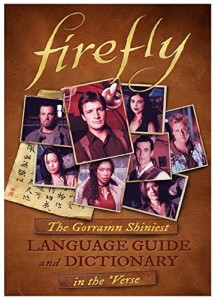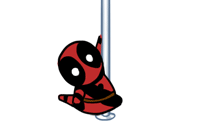
All this week, I’m celebrating the release of Firefly: The Gorramn Shiniest Dictionary and Phrasebook in the ‘Verse from Titan Books. Each day, I’m going to post about an aspect of working as a media/tie-in writer. I hope you enjoy this series of posts!
One of the most interesting aspects of working on other properties is that, over time, I’ve developed a number of skills that I’ve ported over to my own work. Before working on media/tie-in, for example, I was a bit of a pantser because I didn’t have a deadline. Well, I had deadlines when I was in college, and I thrived on them. But, I didn’t think of deadlines the same way I do today. Now, when I get a deadline, I know how important that date is to the overall process of publishing a book, game, comic, etc. Aggressive deadlines also push me to create my best work; when I write under pressure I tend to pound out drafts left and right. Said drafts can be (and are) revised, but aggressive deadlines prevent me from revising as I write. Or, in other words: I cannot revise a blank page, so typing “The End” is better than staring at a blank screen.
In truth, I can no longer work without a deadline. I just can’t. If I don’t have a due date, the project goes into the ether, and I pick at it when I feel I’m free to do so. When I’m a developer or managing editor for a project, I get to decide those dates up front–which is a lot trickier than you might think. Without them, I stress out more than if I had them.
Assessing Word Count
Now, as I am not a cylon or a typing monkey sitting at my machine, what I have the tendency to do is plan for a major output of word count after assessing my schedule for a set period of time (typically three-to-six months). If I push a heavy (5,000 words a day or more) output on a consistent basis, I know my brain well enough to know I’ll need a break to completely cut off internet access and decompress in some fashion. However, if I average out my word count to 3,000 words a day, instead, then I can attach those words to my projects and keep rolling along.
Unfortunately, there are some things that throw me off schedule. I call them “zombie projects”. These are the projects that need to be proofed or are suddenly revived after months of silence. The state of the zombie projects typically have some progress on them already, so I don’t need to reinvent the wheel. However, they can eat away (Hah! Hah!) at my word count and how I prioritize my schedule.
Outlines, Outlines, Outlines
Word count, however, is not a measure of the completed work. Rather, a word count is a benchmark for progress! Just because I write 3,000 words doesn’t mean they’re good or valuable words. Sometimes, they have to go into the trash. An outline, however, can and has facilitated necessary words. Of course, the outline sometimes serves as a general guideline, too, especially if I come up with a better idea. But, as a starting point? Outlines and smaller, daily milestones for word count are invaluable to my work. They help guide the shape of the work, so I’m not overthinking a story or, worse, a game.
Media/tie-ins have also impacted my work by helping me understand the value of an outline with respect to the project itself. Here’s an example of what I’m talking about: say I’m writing a novel about Mumm-Ra from Thundercats. The project stalls, but it isn’t canceled. The license ends, or the publisher/editor/etc. changes, but the contract is still viable and now I’ve got a novel due. What happens in between the time that I stopped writing on said Mumm-Ra novel to when it gets picked up again? The outline will help me not only figure out where I’ve left off, but it also gives me common ground to work with my new co-workers on the project.
Stops and starts, in particular, can be a time sink because re-familiarizing myself with where I stopped on a project makes me lose valuable writing time. Thus, I’ve begun to translate this (outlines) to my original work to address the possibility that the work will be interrupted. Since I’m writing my fiction on spec right now, there’s a good chance that I’ll need to table my own stuff. This way, I don’t feel like I have to start all over again, and I can keep making progress.
I hope you’ve enjoyed today’s post about deadlines, word count, and outlines. Shiny!


